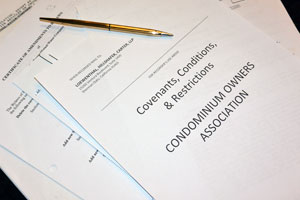LHC NEWSLETTER, VOL 11, NO. 4
Contact us Toll-Free: 1-866-474-5529 (info@lhclawyers.net)
By: Robert D. Hillshafer, Esq.
David A. Loewenthal, Esq.
Barbara A. Higgins, Esq.
NEW CASE LAW – 2020
Published Decisions:
Aldea Dos Vientos v. Calatlantic Group, (2020) 44 Cal.App.5th 1073
Significance: This case is a victory for a homeowners’ association who had a construction defect case against their developer, but neglected to seek a majority vote to proceed to arbitration until after beginning the arbitration process, in alleged violation of their own CC&Rs. The developer was not allowed to use such a provision, intended to protect the association’s members, against them.
Facts: “A condominium association sued the developer alleging construction defects. The association’s governing documents require[d] arbitration of such disputes and a vote of at least 51 percent of the association’s membership prior to beginning arbitration. The association began arbitration without obtaining a vote of its members. Later, the members overwhelmingly voted to pursue the arbitration. The arbitrator dismissed the arbitration for lack of a membership vote prior to its commencement. The trial court confirmed the award and entered judgment for the developer.”
Disposition: Reversed on appeal. The Court of Appeal, Second District, expressly stated that it disagreed with Branches Neighborhood Corp. v. CalAtlantic Group, Inc., which holds otherwise.
Key Findings: The Davis-Stirling Act prohibits the enforcement of unreasonable provisions in the CC&Rs, and a provision that would effectively allow a developer to dismiss a case against it because of the association’s failure to obtain the majority’s vote prior to beginning arbitration, but ratified later, is considered “unconscionable”. Such provisions “contravene statutory policy by giving the developer the unilateral [veto] power to bar actions for construction defects”.
Coley v. Eskaton, (2020) 51 Cal.App.5th 943.
Significance: If an Association Board Director has a material conflict of interest, he or she cannot hide behind the Business Judgment Rule to show they acted in good faith. A Director may still be liable for a breach of fiduciary duties even if there was no personal benefit gained.
Facts: As stated therein, the Eskaton entities, among other things, developed and supported common interest developments for older adults in Northern California. One of those developments was the Village, consisting of 130 homes known as the “Patio” homes, and 137 rented residences housed in a building known as the “Lodge.” It also consisted of several common areas accessible to both Patio and Lodge residents, including walking paths and a maintenance building. Eskaton Village, an Eskaton subsidiary, owned the Lodge and its 137 residences, and various individual homeowners, including Coley, owned the 130 Patio homes. Eskaton Properties, another Eskaton subsidiary, is responsible for the Village’s day-to-day management.
Eskaton Village and the Patio homeowners were members of the Eskaton Village, Grass Valley Homeowners Association (the Association), a nonprofit mutual benefit corporation. A five-member board of directors ran the Association. Plaintiff Coley owned a home in the “Patio” development. He and others brought a class action lawsuit against the Association, two of its Directors, and the Directors’ employer, alleging that the Directors ran the Association for the benefit of the Eskaton entities, to the detriment of the Patio owners and other Association members. Because Eskaton owned a majority of the units in the Association, it held a perpetual voting majority. The two Directors sued were high-ranking management employees of all Eskaton entities. In particular, Plaintiffs contended that the individual Director Defendants unlawfully voted to require the Patio homeowners to cover 83 percent of the cost associated with security services, allowed Eskaton Village to use the Association’s maintenance building rent free, and engaged in other acts of misconduct to benefit Eskaton entities. They asserted this was a breach of their fiduciary obligations to the Association, its members, and constituted elder abuse against Patio homeowners who were aged 65 and older. The trial court found the Directors breached fiduciary duties to the Association and its members, but declined to find the Directors financially personally liable, and awarded homeowner damages and attorneys’ fees against the other Defendants. An appeal and cross-appeal followed.
Disposition: Affirmed in part, reversed in part, and remanded with instructions. The Judgment was modified to find two of the Directors liable financially and personally for their respective breaches of fiduciary duties. The trial court was ordered to recalculate damages and reconsider the amount of the attorneys’ fees awarded.
In this case, the Court of Appeal concluded the Director(s) breached their fiduciary duties by voting, inconsistent with the CC&Rs, to (1) raise the Patio homeowners’ share of the security services from 50 to 83.3 percent, (2) require the Patio homeowners alone to cover certain legal fees, and (3) by disclosing the Association’s privileged communications with its counsel.
Key Findings: A Director cannot obtain the benefit and protection of the business judgment rule when acting under a material conflict of interest. Such a conflict of interest shifts the burden to the Director to show the transaction was “just and reasonable”. They must not only prove the good faith of the transaction, but also must prove “the inherent fairness from the viewpoint of the corporation and those interested therein.” An unlawful failure to abide by an Association’s governing documents can constitute mismanagement, even if not pervasive or egregious.
Davis v. Echo Valley Condominium Association, (2019-2020) 945 F.3d 483 [Sixth Circuit].
Significance: A request for a reasonable accommodation in a discrimination claim under the Fair Housing Amendments Act (“FHAA”) means making an “adjustment” which does not require or impose undue financial and administrative burdens on the Association or third parties’ rights. A smoking ban was not a reasonable accommodation.
Facts: Plaintiff, a cancer survivor with “a history of asthma and multiple chemical sensitivity disorder,” sought to restrict and then ban smoking through the filing of her lawsuit. Ms. Davis owned a condominium on the second floor of a four-unit building in the complex. She sued the Association and property manager, claiming disability discrimination in violation of the FHAA, after making numerous complaints about “nuisance” violations caused by the smell of cigarette smoke, coming primarily from a unit on the first floor. Eventually, those first floor tenants moved out and the owners sold their unit, presumably because of all the complaints from Davis. Because Davis allegedly continued to have issues with the smell of smoke from new and different sources after the tenants moved out, she asked the Association to grant her a “reasonable accommodation and prohibit smoking within her building.” The Association circulated a by-laws amendment package, proposing a smoking ban in the complex, which failed to pass. After the trial court granted Summary Judgment in favor of Defendants, Plaintiff Davis appealed.
Disposition: Summary Judgment affirmed. Plaintiff appealed to Supreme Court which declined to hear her case.
Key Findings: The smoking ban was not a reasonable accommodation under FHAA since Davis requested a fundamental change in the Association’s smoking policy, not a moderate adjustment to the rights of third parties. The by-laws, which are in the nature of a contract under Michigan law, did not require the Association to ban smoking, and ordinary levels of smoke could not be considered a danger or pollution. The nuisance claim was also barred on the basis that the Defendants did not possess or control the units in Plaintiff’s building which was a requirement under Michigan law.
Third Laguna Hills Mutual v. Joslin, (2020) 49 Cal.App.5th 366
Significance: Enforcement of CC&Rs was not considered a public issue or one of public interest for purposes of an anti-SLAPP motion. And, anti-SLAPP did not apply because the Court did not believe the tort claims arose from the Association’s filing of the Complaint, but arose instead from actions taken to enforce rental prohibitions.
Facts: An HOA brought an action against homeowners of a unit for violation of the CC&Rs and fraudulent conveyance arising out of the owners allowing unqualified persons (non-seniors) to reside in the home, who in turn, caused nuisance violations by playing loud music. The homeowners cross-complained for intentional interference with existing contractual relations, breach of implied-in-fact contract, and other claims. The HOA moved to strike the cross-complaint under the anti-SLAPP statute, claiming the cross-complaint arose out of prelitigation threats and the filing of the underlying lawsuit. Its motion was denied and the HOA appealed.
Disposition: The Judgment was affirmed.
Key Findings: The Court held that (1) the homeowners’ tort claims arose from HOA’s actions preventing homeowner from renting their home, not from HOA’s filing of a complaint; (2) whether the litigation privilege applied to the HOA’s statements was irrelevant to the analysis of whether homeowners’ claims arose from protected conduct for anti-SLAPP purposes; and (3) enforcement of HOA covenants, conditions, and restrictions was not a public issue or issue of public interest. The instant lawsuit was essentially considered a monetary dispute between the HOA and Joslin.
2020 Unpublished Decisions of Educational/Informative Value:
The following cases are not binding, legal precedent, but give the reader some idea of how a court might rule under the same or similar circumstances. The cases are not officially published decisions, so cannot be cited in court documents.
Alexander v. Singletary, (2020) WL 289204
Summary: Civil Code Section 5975 (c) authorizes an award of attorney fees to the prevailing party in “an action to enforce the governing documents” of a common interest development. This appeal from a Riverside County Superior Court Summary Judgment denying an award of attorneys’ fees to Defendants, required the Court of Appeal to consider whether the statute applies when a court rejects a homeowner’s action seeking a judicial declaration that governing documents were unenforceable against him. The trial court denied the homeowner’s claims for declaratory relief and partition from the common interest development after concluding the documents were, indeed, enforceable. The Court of Appeal concluded the statute applies because the gravamen of Alexander’s action involved the enforceability of the governing documents. Therefore, the trial court’s order denying attorney fees to prevailing defendants was reversed in favor of those Defendants who appealed. This case is significant because it allows for attorneys’ fees even when the action does not involve the enforcement of particular provisions in the governing documents, but instead the gravamen of the Complaint was the question of the enforceability of the documents as to Plaintiff (to whom they were found to apply).
Club Acacia Community Association, (2020) WL 3024491
Summary: After the Association prevailed in a jury trial and was awarded its attorneys’ fees by the Superior Court, the Court of Appeal reversed the award, finding that the attorneys’ fees should not have been awarded because there was no arbitration. A legal dispute had arisen over the problematic installation of a fire alarm system at a condominium building. Neither the Association or the Property Manager requested arbitration and instead litigated the matter through trial, during which lawsuit, both sides requested their attorneys’ fees. However, it was the Arbitration Clause that provided that “the prevailing party in the arbitration” shall be awarded reasonable attorneys’ fees. The Court of Appeal concluded that the Arbitration Clause was patently unambiguous that attorneys’ fees were to be awarded only by an arbitrator (and not by a Judge) following an arbitration (and not a jury trial). The Arbitration Clause did not authorize the trial court to award attorneys’ fees, only an arbitrator.
Maravich v. Dover Shores Community Association, (2020) WL 1061065
Summary: Plaintiffs filed suit seeking declaratory and injunctive relief, plus attorneys’ fees, arising from a Homeowners’ Association’s alleged failure to prevent other homeowners from obstructing the view from Plaintiffs’ home. In a bench trial, the Court interpreted the relevant provisions of the CC&Rs as giving the Association the discretion to permit tall trees, even if they impede a homeowner’s view. However, also at issue was a 2014 Landscaping Rule that Plaintiffs argued was inconsistent with the CC&Rs, and the Court ruled in favor of Plaintiffs on that issue. Ultimately, the Court of Appeals agreed there was a difference between the Landscaping Rule and the CC&Rs provision, but merely being different did not render them inconsistent. Both the Rule and CC&Rs allowed the Association to exercise its discretion. Since Plaintiffs did not ask for an interpretation of the words, “impede” or “detract” [from the homeowners’ view] in their operative Complaint, the Court found no error in the judgment for not deciding the proper interpretation. The Association was awarded its attorneys’ fees as the prevailing party in spite of the homeowners’ argument that the attorneys’ fee award should have been reduced because the trial court deemed the 2014 Landscaping Rule to be invalid because it was inconsistent with the CC&Rs. Since that aspect of the judgment was reversed in favor of the Association, it was deemed to be the prevailing party overall.


